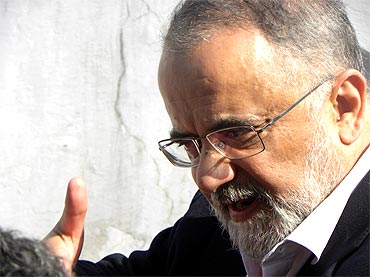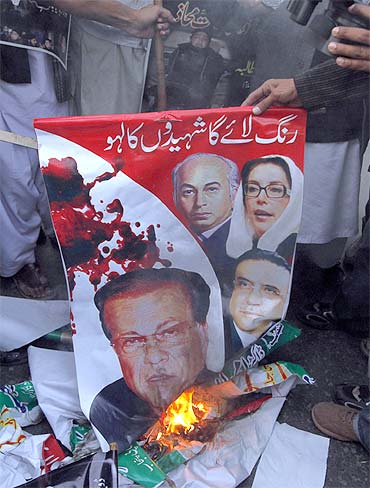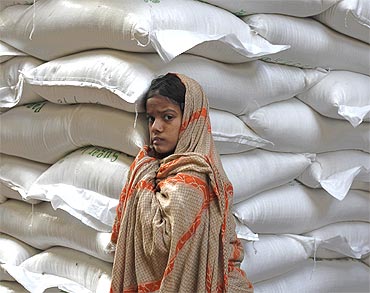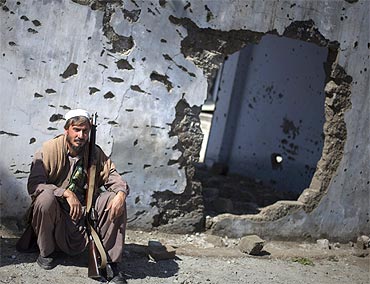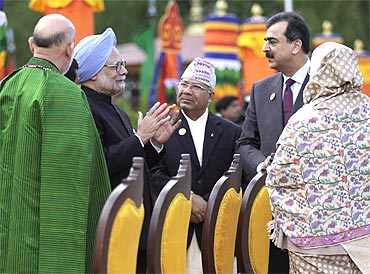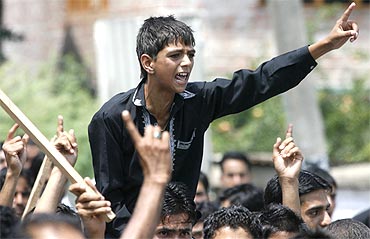 | « Back to article | Print this article |
'Both India, Pak waiting to see who blinks first'
Former revolutionary and Lahore-based author-journalist Ahmed Rashid speaks on why India should play a more proactive role in the subcontinent for its own good, reports Abhishek Mande
Revolutionaries, they say, make for great speakers and Ahmed Rashid is no exception.
The Lahore-based journalist and author who spent ten years in Balochistan trying to organise an uprising against Pakistani dictators Ayub Khan and Yahya Khan was at the recently concluded Jaipur Literature Festival where he spoke about the dodgy relations between Pakistan and India and AfPak issues among other things.
Talking to a group of select journalists, Rashid explained why Kashmir for India is just one of the many issues that it needs to address for a more peaceful subcontinent.
The author also talked extensively about the state of Pakistan and admitted that it may not be very easy to reign in some groups that exist on its soil and have been carrying out terrorist attacks in India.
Please click NEXT to read what Ahmed Rashid thinks about the Indo-Pak relationship, the Kashmir row and Afghanistan..
'If Pak goes downhill, India will be adversely affected'
Despite all its growth and economic advancement, India still faces huge domestic problems, of which just one is the Kashmir issue, Rashid noted.
"India needs to focus a lot more on domestic problems before it can project itself as a viable modern or a mid-level income state. (Having said that) there also has to be an improvement of relationship with its neighbours," he said.
"I don't think a big power like India can exist in a neighbourhood that is basically hostile. Unfortunately there hasn't been a lot of focus on your neighbourhood foreign policy ever since (former prime minister Atal Bihari) Vajpayee's initiatives.
"You've gone to the United States, to China, Japan etc but you've had up and down relations with Bangladesh, Nepal, Sri Lanka," he said.
"There has to be an initiative within the neighbourhood, of which Pakistan is just a part. If Pakistan starts going downhill, India will be adversely affected. Drugs, guns, terrorism you will have it all," Rashid warned.
"All your uprisings and insurrections will get a huge boost and they will link themselves with terror groups from across the border. It is in India's interest to stabilise Pakistan, help it see sense and not have non-stop confrontations," he added.
'Some groups in Pakistan have gone out of control'
Pakistan has been trying to project power in Afghanistan and Kashmir when we hardly have a country to promote right now (and) a country that is beset with problems," Rashid said.
"There are groups in Pakistan carrying out terrorist attacks and these groups haven't been reigned in adequately. Unfortunately we don't even know if we can reign in these groups anymore because some of them are out of control.
"One of my tasks through my writing is to explain to the Pakistani authorities that if they continue to project schemes to take over Kashmir and Kabul, we will be left without a country," Rashid noted.
"(Pakistan Punjab Governor) Salman Taseer's killing came as a huge shock but what the bigger shock was the aftermath -- so many policemen, lawyers, and teachers came out in support of the killer.
"We obviously didn't realise the degrees of penetration (of the extremists) in middle class society," he said.
'Pakistan is not a failed state'
Despite everything, I still think Pakistan has a long way to go before it becomes a failed state and Afghanistan will not be one till there are Western forces present to prop it up," he said.
"Pakistan is a functioning state. It is not Afghanistan where there is no state. It can correct itself. Even today Pakistan has a lot of institutions that are still intact.
"What we need is to improve our education system, change the jehadi rhetoric, which is being taught even in government schools and not just madrassas.
"We also need a revival of political principles of Jinnah and others. Every ruler ignores them and what they meant," he said.
"Jinnah didn't mean for Pakistan to be an Islamic state. He wanted it to be a democratic state for the minorities in India that included Muslims, Christians and anybody else who wanted to live in Pakistan.
"The whole subversion of Pakistan wanting to be an Islamic state came in the late 50s. I would like to believe we are still a long way from going down.
"The problem is that major policies are not being corrected. They are in hands of military and the military is still fighting the Cold War. It is not fighting the war of globalisation and it is not coming into the modern era.
"So the real question is: Does the military and political elite have the capacity and courage to actually make the corrective measures that are needed?
"Can Pakistan regain political initiatives with alienated sections of the society? Sections like Baloch or the extremists for instance?
"Sadly the tragedy is we don't have the kind of leadership to do this. There is no political or military leadership at any level that could show us a way out of these morasses. I fear there will be more destabilisation," he concluded.
'No one can demilitarise Afghanistan'
NATO is building up a new Afghan army and (you can see there is incredible wastage in that)
"25 per cent of the soldiers who are recruited desert with their weapons! That is a huge source of instability," Rashid said.
"Besides it's a free for all there. Everyone -- the extremists, the fundamentalists, the northern militias who are anti-Taliban -- are importing weapons and arming themselves.
"(In more ways) we are moving further away from demilitarisation.
"Back in 2003 and 2004 when the United Nations disarmed 60,000 militia members before the 2004 presidential elections, it was a big deal. Now 60,000 weapons are like chicken feed.
"The truth is no one can do it (demilitarise). It is to give another task for western alliance that is already trying to demobilise itself and doesn't want to get involved in nation building. This would be part of nation building," he said.
'There is a generational shift in the Taliban'
I don't speak of moderate or extremist Taliban. What I do believe is that there is a generational shift in Taliban.
"The older leadership that was in power in the 1990s has become much more reasonable because it has seen the world, has been in exile for a long time and has been defeated.
"Recently they issued a statement saying they don't have anything against girls' education and they're not the ones burning girls' school.
"This leadership is ready for talks with Afghanistan President Hamid Karzai. They are fed up of being in exile; they've suffered huge casualties because of war; fed up of being manipulated by Pakistan and intelligence agencies. And now they want to go back to Afghanistan and take part in the government. But they want a deal to do that.
"Meanwhile, another group has emerged in the last three or four years. These are commanders or sub-commanders in the south like Helmand and Kandahar.
"These are young people who have come out of madrassas and a lot of them are ideologised owing to Al Qaeda etc. They are dangerous elements, do not like peace and would rather like to seize power.
"The question is how much clout does the old Taliban leadership have over these younger elements? We can only test this answer in a peace process by talking to them!
"It is a huge risk but we must be willing to take that risk if we want some kind of solution before the West pulls out. The peace process in Afghanistan has to start before the West pulls out completely. I don't see anything wrong in talking and fighting at the same time -- this is how Vietnam ended, how Northern Ireland (crises) ended.
"To resolve the issue, a lot of things must be done simultaneously.
"You need to get Karzai and Taliban to talk. You need to get some kind of dialogue going between America and Taliban. And you need to get regional initiative going that brings countries like India, Pakistan, Iran and all these countries together
"The idea of a timetable for withdrawal is (a bad idea) because timetables are arbitrary and have nothing to do with reality on the ground.
"These schedules are set (created) in western capitals according to parliament, budgets and elections of western leaders, he noted.
"They are not being set according to the reality inside Afghanistan -- how much progress has been made in talks with the Taliban or with the neighbouring countries. Such timetables are totally arbitrary," he said
'Both India and Pakistan are waiting to see who blinks first'
Most Pakistanis believe terrorism in Pakistan is result of America's war in Afghanistan.
"I don't believe so. It is, I feel, due to the fact that Pakistan allowed the Afghan Taliban to live with the Pakistani tribes. You can blame Americans for creating your problem. Own up to your problems; live with your problem.
"The same goes for Kashmir. India has to stop using extremist forces as some kind of political blackmail.
"Both India and Pakistan are waiting to see who blinks first. Will Indians blink and open talks on Kashmir or will Pakistan blink first and reign in the Lashkar-e-Tayiba? So it's become an 'I dare you, you dare me' game.
"This is a terrible way to run international politics.
"In this context, I put enormous onus on India because you are dealing with a neighbour who is nuclear armed and in a state of total paralysis and crisis.
"So it doesn't suit your interest to see Pakistan go down the tube in any way.
"You need to think more proactively and more productively despite the objections you may face from Pakistan. You must think differently, in a more mature manner and think about the region as a whole rather than the same old fight on Kashmir when you are having a dialogue with Pakistan, Rashid said.
'India has utterly failed in Kashmir'
In Kashmir, India has utterly failed. You haven't been able to deal with the mass insurrection by the youth and that is a crying shame. There has to be much more government initiative.
"While this was happening, Pakistan by the way was petrified.The last thing it wants is to see a similar insurrection in Pakistan occupied Kashmir that is tightly controlled by the army.
"In those six months we didn't say a word or give support to these kids. Pakistan never said 'Kill more Indians!' Pakistan was quiet because we were petrified that this will come to their doorstep too.
"What really is needed in Afghanistan is both of us to talk in transparent manner. There has been no Indo-Pak dialogue on Afghanistan since 9/11. Neither country has any clue of what is going on.
"Back in 2004-05 when the insurgency was going on, I went to the Indian consulate in Kandahar. At the time the Pakistanis were saying that there were 50 Indian intelligence agents training there when in fact there were just seven Hindu employees working there, petrified out of their wits.
"They didn't know the local language; they hadn't left the compound and obviously there were no RAW agents being trained. You need transparency on both sides to deal with such misconceptions.
"The Pakistani press says you have some 15 or 50 Indian consulates in Afghanistan. What they don't realise is if this was true India would have to move the whole foreign office to Afghanistan!
"India has four consulates in Afghanistan. So does Pakistan. All this has to be made transparent. Only this will help the peace process," Rashid concluded.
